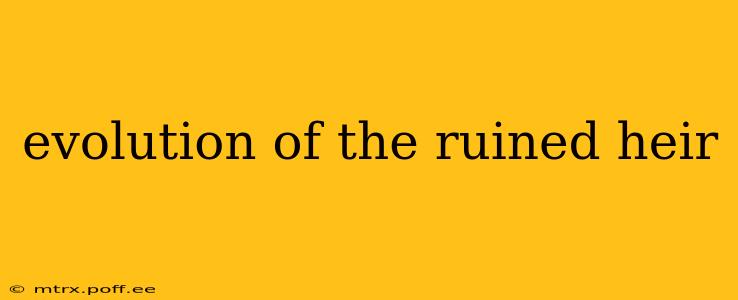The "ruined heir" trope, a staple in literature and storytelling across numerous genres, has undergone a fascinating evolution. Initially presented as a cautionary tale of squandered privilege and moral decay, the ruined heir has blossomed into a far more nuanced and complex character archetype. This exploration delves into the historical context of this archetype, its changing portrayals throughout time, and the reasons behind its enduring appeal.
What is a "Ruined Heir"?
The classic "ruined heir" is typically a member of a wealthy or aristocratic family who, through recklessness, addiction, poor choices, or unforeseen circumstances, loses their fortune and status. This downfall often serves as a plot device, driving the narrative and prompting the character's arc of redemption (or further decline). Think of characters like Hamlet (arguably a ruined heir to the throne) or the prodigal son in biblical tales. They embody the consequences of bad decisions or unfortunate fate, often highlighting societal judgments about wealth, power, and morality.
The Evolution: From Morality Play to Psychological Depth
Early portrayals of ruined heirs often served a didactic purpose. They functioned as cautionary tales, emphasizing the perils of excess and the importance of virtue. These characters were frequently one-dimensional, representing a single flaw – gambling addiction, reckless spending, or moral corruption. Their downfall was swift and their redemption (if any) often felt unearned.
However, as literary and storytelling techniques evolved, so did the representation of the ruined heir. Modern iterations of this archetype are far more complex and psychologically driven. Instead of simply embodying a single vice, they may grapple with internal conflicts, trauma, mental health issues, or the pressure of inherited expectations.
How has the portrayal of the ruined heir changed?
-
Increased Psychological Depth: Modern narratives delve into the psychological motivations behind the heir's downfall, exploring themes of self-destruction, societal pressure, and the impact of trauma on their behavior. We see the character's internal struggles and their journey of self-discovery, making them more relatable and sympathetic.
-
Nuance and Ambiguity: The clear-cut morality of earlier portrayals has been replaced with ambiguity. Modern ruined heirs are not simply "good" or "bad." Their actions may be morally gray, reflecting the complexities of human nature.
-
Agency and Redemption: While some ruined heirs remain trapped in cycles of self-destruction, many modern iterations demonstrate agency and the potential for redemption. Their journeys are often characterized by struggle, growth, and ultimately, the possibility of rebuilding their lives, not just their fortunes.
Why Does the Ruined Heir Trope Endure?
The enduring appeal of the ruined heir trope stems from its inherent dramatic potential and its reflection of universal human experiences. The themes of loss, redemption, and the struggle against adversity resonate deeply with audiences. Moreover, the archetype allows for exploration of various societal issues: class inequality, the pressures of inherited privilege, and the consequences of unchecked ambition.
What makes this trope so appealing to audiences?
-
Relatability (despite the privilege): Even though the character begins with immense privilege, their struggles with addiction, self-doubt, and the search for meaning are universally relatable, transcending socioeconomic boundaries.
-
Dramatic Potential: The fall from grace provides a compelling narrative arc, full of dramatic tension and potential for both tragedy and triumph. The reader (or viewer) is invested in the character's journey, regardless of their moral standing.
-
Exploration of Societal Issues: The ruined heir trope offers a unique lens through which to examine issues of class, societal expectations, and the corrupting influence of power.
The Future of the Ruined Heir
The evolution of the ruined heir continues. As societal norms and our understanding of human psychology evolve, so too will the portrayal of this enduring archetype. We can expect to see even more nuanced and complex characters grappling with a wider range of internal and external conflicts, offering a richer and more insightful exploration of the human condition. The fallen heir will continue to be a compelling figure, prompting introspection and sparking discussions about the complexities of privilege, morality, and the enduring quest for meaning in a chaotic world.
